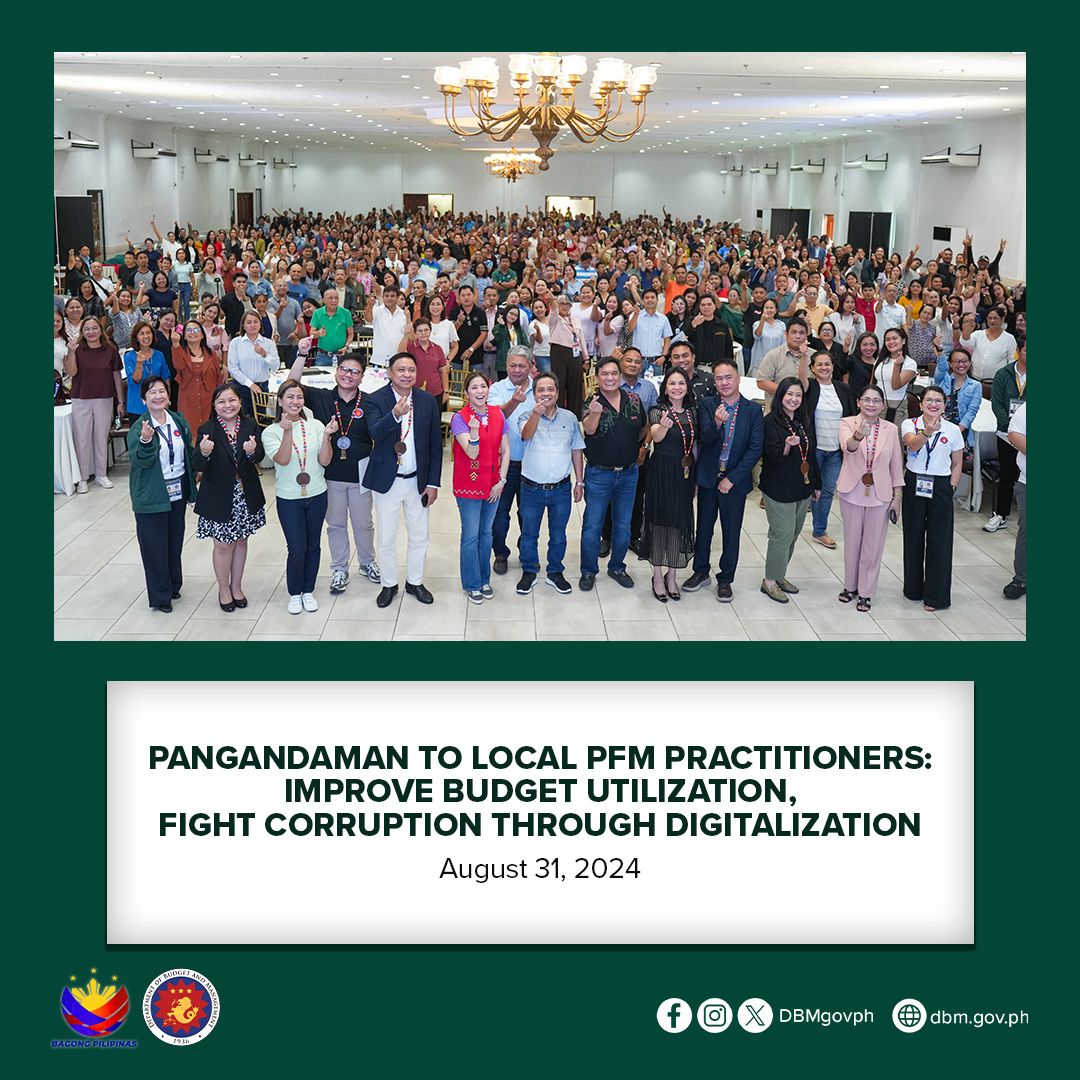
Department of Budget and Management (DBM) Secretary Amenah F. Pangandaman encouraged local governments to fully utilize their budgets, fight corruption through digitalization, and explore the possibility of providing medical allowances to their employees during the last day of the Public Financial Management Competency Program (PFMCP) for Local Government Units (LGUs) held in Butuan City on August 30, 2024.
Improving budget utilization
In her keynote message, Secretary Pangandaman encouraged local governments to fully utilize their respective budgets, “para naman mas makita po natin ang kagandahan ng Bagong Pilipinas dito sa rehiyon at sa bawat LGU (so that we can truly see the beauty of Bagong Pilipinas here in the region and in each LGU).”
According to the Budget Chief, improving government spending will not only fast-track the delivery of public goods and services but also enable the country to maintain its standing as one of the best-performing economies in Asia. In the second quarter, the Philippine economy expanded by 6.3 percent, outpacing Singapore, Indonesia, Malaysia, and China.
“Kaya po importanteng magastos ang inyong budget. Kaya nandito po kami… we are helping you, hand-holding you, para magabayan namin kayo kung paano tamang gastusin ang ating mga budget (That’s why it is important to spend your budget. That’s why we’re here… we are helping you, hand-holding you, so that we can guide you on how to spend your budget judiciously),” the Secretary told the local budget officers and PFM practitioners from Caraga who attended the program.
Under the proposed Php 6.352 trillion National Budget for next year, LGUs will be allocated Php 1.184 trillion to support the implementation of their respective local programs and projects. This already includes the statutory shares of LGUs from national taxes, such as the National Tax Allotment and the BARMM Annual Block Grant, among others.
Fighting corruption through NGPA, digital transformation
The Budget Chief also emphasized that, aside from regional development, digital transformation of the bureaucracy is one of the administration's top priorities in fighting graft and corruption. About Php 70.6 billion will be allotted for digitalization in 2025, 9.29 percent higher than its allocation this year.
“When we first entered this administration, that’s the very first directive of the President—to use digitalization to expedite government transactions and make them more transparent,” she added.
Secretary Pangandaman also shared that with the recently signed New Government Procurement Act (NGPA), local governments can now look forward to a better procurement system that meets their evolving needs.
“Ito pong NGPA, unang araw ko pa lang po bilang Budget Secretary, talagang kasama na po ito sa aking checklist. Dahil gusto ko po talagang matanggal ang corruption sa procurement, at the same time, gawing mas efficient, effective, mabilis, up-to-date, at digitalized ang ating procurement system (From my very first day as Budget Secretary, NGPA has already been in my checklist because I want to eradicate corruption in procurement, and at the same time, make our procurement system more efficient, effective, expeditious, up-to-date, and digitalized),” Secretary Pangandaman said.
Exploring provision of medical allowance for LGU employees
Finally, the Budget Chief also encouraged LGUs to explore the possibility of providing medical allowance to local government employees to give them better access to quality public health services.
“We also have medical allowance in the Executive (branch). Maybe eventually, local governments can also embrace that kind of allowance and benefit,” Secretary Pangandaman said.
Beginning in 2025, qualified government employees from the National Government will receive a medical allowance not exceeding Php 7,000 yearly to enable them to avail of services and benefits from Health Maintenance Organizations.
For LGUs, the provision of medical allowance will depend on their financial capacity and is contingent on the authorization of their respective Sanggunian, subject to the provisions of pertinent laws and issuances.
The PFMCP for LGUs aims to capacitate local PFM practitioners nationwide on all stages of the budget process—from preparation to procurement and budget accountability. As of date, the program has empowered almost 6,000 PFM practitioners nationwide, with about 600 participants coming from the provinces of Agusan del Norte, Agusan del Sur, Surigao del Norte, Surigao del Sur, and the Province of Dinagat Islands for its latest leg.
END

